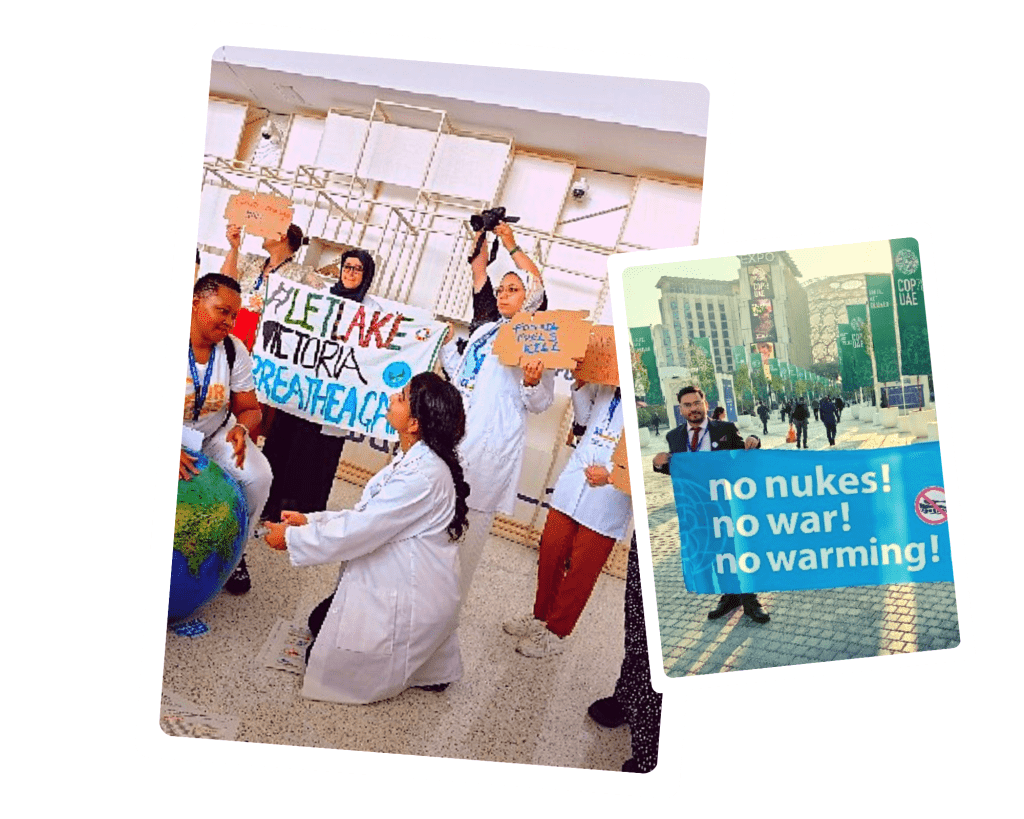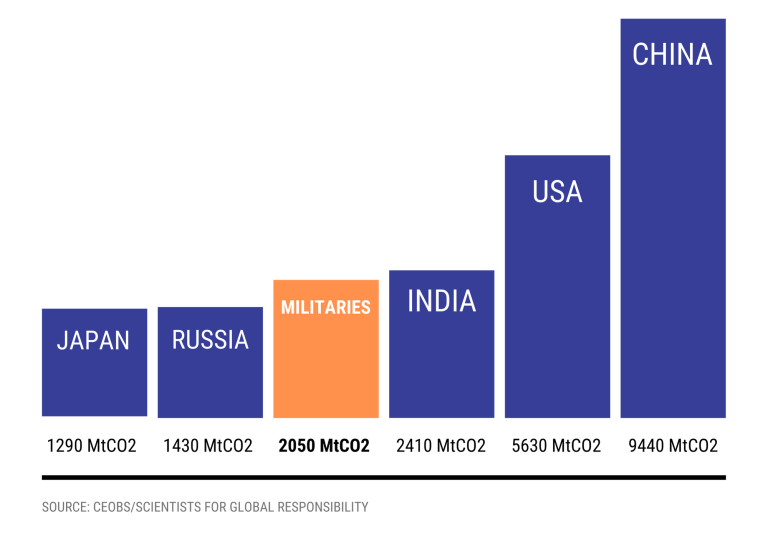Peace +
Climate
Peace is the key enabler of the global, cooperative action required to address our climate emergency.

Military Emissions
If the world’s militaries were a country, it would have the fourth biggest carbon footprint.
But countries don’t count their military emissions, or have military emissions reduction targets, creating a significant ’emissions gap’ and making it less likely that global temperature rise can be limited to 1.5°C as specified in the Paris Agreement.
In Australia, Defence is the biggest public sector emitter, but did not report emissions between 2012 and 2023, when public pressure obliged a change in practice.
If Defence is to play a role in minimising the threat of climate change, decarbonisation alone will not be enough. It must also address how reducing military expenditure, activities and deployments, and increasing efforts towards peace and stability, can reduce emissions and minimise the threat of climate change.
MAPW is working to secure government commitment to:
- Inclusion of military emissions from all sources and supply chains in overall calculations of Australia’s emissions
- Transparent, accessible, independently verifiable and fully disaggregated reporting of military emissions
- Increased efforts towards peace, and reductions in military spending and activity

Learn more about the effect of military activity on the environment:
Climate Collateral; How military spending accelerates climate breakdown, Transnational Institute
The military’s contribution to climate change, Conflict and Environment Observatory
Climate change & the military, compilation of reports from Scientists for Global Responsibility
News: Peace + Climate
Subscribe to stay in touch with MAPW people, news, actions and events.
"*" indicates required fields
Nuclear weapons and climate
A new report from ICAN examines the link between nuclear weapons and catastrophic climate change.
Read MoreEnvironmental effects of war on Gaza
Mounting evidence suggests Israel has conducted intentional, indiscriminate, and disproportionate attacks against the environment in Gaza.
Read MoreCountering Dangerous Narratives on Climate and Migration
New guide for centering justice and rights in discussions of climate-linked migration.
Read MoreTo tackle climate change, we need peace
Preventing wars, demilitarisation and promoting peace are vital strategies for tackling climate change.
Read MoreGovt keeps climate security report under wraps
Failure to release intelligence assessment is not in public's interests.
Read MoreIPCC Synthesis report omits Military Emissions
Intergovernmental Panel on Climate Change omits information on military emissions, citing need for better evidence.
Read MoreCOP 27: missed opportunity on military emissions
Lorem ipsum dolor sit amet, consectetur adipiscing elit. Ut elit tellus, luctus nec ullamcorper mattis, pulvinar dapibus leo.
Read MoreTaking Action
Using a peace framework to think about climate action can mitigate securitised and competitive responses to our crisis.

Climate change is increasingly being addressed as a ‘national security’ issue, where the predicted effects of climate change are seen as threats to social stability, geopolitical influence, and access to resources.
But a securitised approach to climate change is likely to exacerbate injustices for those most affected by the unfolding crisis, and to reinforce military power.
Over-emphasis on the connection between climate change and conflict also leads to nationalistic approaches to a global problem, fuels arms races, distracts from causal factors leading to conflict, and undermines other approaches to conflict resolution.
MAPW advocates for:
- Investment in diplomacy and aid, and climate finance
- Demilitarisation and reduction in military spending and activity
- Elimination of weapons of mass destruction
- Cooperation among nations
- Just and rapid systemic transformation and decarbonisation
Toxic weapons, like white phosphorus, are still used in contemporary conflicts. Toxic remnants of war, like heavy metals, dioxins, and human carcinogens, pollute air, land and water and affect human health long after war ends.
War destroys and degrades agriculture, biodiversity, and natural resources through use of explosive and incendiary weapons, unexploded ordnance, and the collapse of environmental governance.
MAPW advocates for:
- Elimination of weapons of mass destruction
- Protection of the environment through prevention of war
- Implementation of the UN legal principles Protection of the environment in relation to armed conflicts (PERAC)
- Demilitarisation